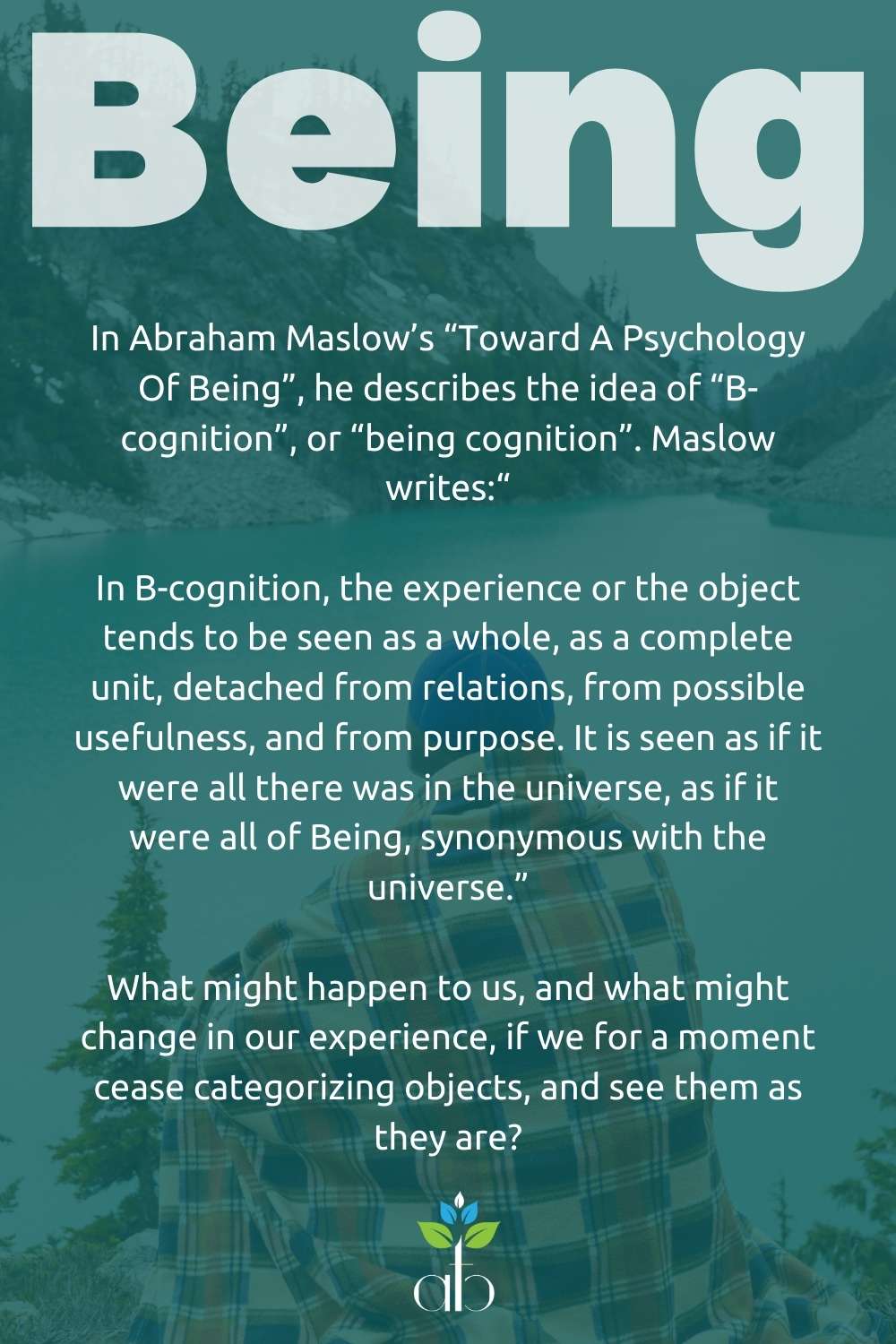Episode 169
Noticing Being

Sometimes when Australians come to Mexico, they become extremely enthusiastic about avocados, perhaps eating several a day. Of course in Australia, a single avocado can cost $2 or $3, and in Mexico you might find much fresher avocados for $1 or $2 per kilo.
Because of the perceived scarcity, they’re valued more. And of course, when something is seen as common, it is valued less. So often we see things in context, in comparison to other things, and not complete of themselves.
In Abraham Maslow’s “Toward A Psychology Of Being”, he describes the idea of “B-cognition”, or “being cognition”. Maslow writes:
“In B-cognition, the experience or the object tends to be seen as a whole, as a complete unit, detached from relations, from possible usefulness, and from purpose. It is seen as if it were all there was in the universe, as if it were all of Being, synonymous with the universe.”
What might happen to us, and what might change in our experience, if we for a moment cease categorizing objects, and see them just as they are?
Hosts & Guests
Kurt Robinson
Transcript
Let’s talk about valuing whats right in front of you.
I just sat down to lunch and had some rice and chicken. I got an avocado from the fridge and opened it and put the whole thing over my plate and I was thinking, sometimes austrailians come to mexico and get obsessed with avocado.
People ask me often why do Austrailians like avocado so much? In Austrailia if you buy one it costs 2-3 dollars for a single avocado and here you pay one to 3 dollars for a kilogram.
Having had that scarcity in Austrailia these things seem more valuable.
Many years ago, well you can still see in some parts of Europe are these sculptures of Pineapple because it was once a symbol of decadence or luxury. A person had to be really rich to afford a pineapple, this exotic fruit imported by sea and still somehow was fresh when it arrived.
And it’s funny how we value these things more because they’re scarce. It makes sense but we don’t have to value them because they’re scarce.
We can value them on their own merits. We don’t have to look at the context but we can look at the thing, itself.
When I was detained in Mexico City before they deported me from Mexico they would serve me this food. It wasn’t good, textured vegetable protein and other things. At least I have food, at least they’re feeding me.
Then being in the world, even in my own kitchen having the freedom to cook for myself and make myself delicious food and have that freedom and make something for myself and prepare in the way I like.
Put the extra time, attention and care to make it something special. That’s something I can appreciate and be grateful for.
That’s the thing, kind of arbitrary to put value on something because it’s scarce. Perhaps it’s our opportunity to put value on something because it’s ours, in that moment. Ours to enjoy so it’s nice to be grateful for those things. Thanks for listening, have a wonderful day.
So listening back to this recording, I wanted to add a few more notes on it because I’ve been reading Abraham Maslow’s Toward a Psychology of being and he actually goes into some detail about this concept. He makes this distinction between D cognition and B cognition.
So D cognition stands for deficit cognition and its a state of being most of us are in a lot of the time so when we’re thinking about what is the problem or what’s wrong here or how can I solve this? That’s D cognition. I’m oversimplifying here, he goes into detail.
If you’re interested read the chapter.
B cognition stands for being cognition. Self actualized people tend to be in this state of being cognition more often so in a sense you might say, oversimplification that self actualized people turn off their thinker or this part of their mind that is categorizing things and saying “This is just like that.”
Or this table is just a table. Putting these things in our mind as if we know exactly what they are rather than looking at them as objects in their own right, as I was talking about with the avocado example.
Here’s one key quote: “In B cognition the experience or the object tends to be seen as a whole complete unit detached from relations from possible usefulness and purpose. It is seen as if it is all there is in the Universe, as if it were all of being. Synonymous with the universe.”
He also talks about how when we’re in B cognition the object of our attention is fully attended to. WE might call this mindfulness, this is also very much related to certain mystic states that are described for example in the Yoga Sutras.
States where we might start to loose the idea of who we are while we meditate on an object. I wanted to add in those few notes there to make extra distinctions. Thanks so much for listening and have a wonderful day.

New Episodes Every Weekday
11am Mexico City time
10 min episodes Monday - Thursday
1 h interview episode on Fridays
As an Amazon Associate I earn from qualifying purchases.
Stay Beautiful &
Stay Connected
